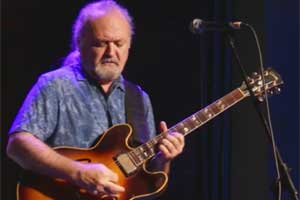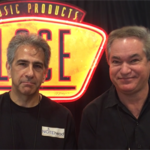Red Clay Soul man plays songs, and styles, of the South
By Gary Graff
June 10, 2016
Hailing from Atlanta, Tinsley Ellis grew up in a musical melting pot. But it was his favorite British Invasion bands — the Yardbirds, the Rolling Stones, the Animals, Cream and others — that led him to the blues, and seeing B.B. King live sealed the deal. He played with the Haygood Band in college and played with a group called the Alley Cats (including future Fabulous Thunderbirds bassist Preston Hubbard), but it was the Heartfixers that launched Ellis’ career with three albums during the mid-80s. After that Ellis went solo, releasing a series of critically acclaimed albums leading up to this year’s Red Clay Soul, on his own Heartfixer label. He still resides in Atlanta and stays true to the rock ‘n’ blues roots that got him here in the first place.
FGPO: How did you start playing guitar?
Ellis: I begged my parents for a guitar after seeing the Beatles on The Ed Sullivan Show in 1964 — how common of a story is that? I was seven years old or something. They rented me an acoustic guitar with the caveat that I take lessons. I think I took four lessons or something, then started lobbying hard for an electric guitar so I could play stuff like “Dirty Water” by the Standells or the Stones or the Beatles, of course.
FGPO: How did you get from there to what you play now?
Ellis: The first act I ever went to see in a nightclub was a regional band, Wayne Cochran & the CC Riders. I snuck in; I think I was about 14 years old. He was the white James Brown. He was our Mitch Ryder, and it was a soul band with a horn section. And they all dressed alike, and they were doing dance steps. And he had this giant white pompadour. That pretty much sealed my fate; I was gonna try to have a sound sort of like that. And then after that I saw B.B. King and Howlin’ Wolf and Muddy Waters, which, for a guitar player, that’s really where you want to go with it. It’s those first people you see that are the ones that sort of stick with you.
FGPO: Your new album’s title, Red Clay Soul references where you’re from, doesn’t it.
Ellis: Oh yeah. At one point, we were recording one of the songs — I think it’s the duet I did with Oliver Wood from the Wood Brothers. At one point, keyboardist Kevin McKendree, the co-producer, blurted out, “Man, this album has a serious Southern vibe to it!” And I don’t think he was talking about Lynyrd Skynyrd or cowboy hats or anything. I think that he was hopefully talking about some of the stuff that goes on in this region, and what’s still going on down here with people like Clarence Carter and folks like that. We wanted to name the album after sort of the way we thought it might sound here, so it was Red Clay Soul for the Southern thing.
FGPO: So what is that sound you were after?
Ellis: I think it’s that kind of lazy backbeat that goes in the music. I would never compare myself to Booker T & the MGs, for instance, but that’s the goal. That’s my favorite band, so the goal is to have that kind of fatback backbeat going on.
FGPO: What do you feel are the indigenous characteristics to guitar playing from this area?
Ellis: Certainly the guitar players from this area, the main cats were Dickey Betts and Duane Allman. I was a little too young for Duane Allman, but I was all about the Dickey Betts thing. They had some people that sorta followed in their footsteps, and now we’ve got people like Warren Haynes and Derek Trucks. It’s kind of a tradition here, and blues is a big part of that. But y’know, interestingly enough, Atlanta is a huge guitar town, but it is a song town. We had some people like Classics IV and Joe South, who was a wonderful songwriter, and later the Atlanta Rhythm Section. So Atlanta was kinda more about the songs, but I’ve always been about the guitar playing, so naturally I gravitated to the Southern rock thing.
FGPO: Of course, Southern rock is a pretty wide terrain in its own right?
Ellis: Oh yeah. I went to school with Peter Buck from R.E.M. [at Emory University]. He totally went the opposite direction from me; he went to Athens to follow what the B-52’s were doing. He was very anti-guitar solo, and that was a big thing in Georgia for awhile. I’ve never really been in touch with the trends [laughs]; I’ve always been out of sync. But Peter Buck was a guy, he got in a bar fight defending the Monkees, and he was right. They were all about the song, and they had some great ones.
FGPO: Do you feel like we’re in a post Guitar Hero generation now?
Ellis: Well, everybody likes to play the hell out of lead guitar. You’ve got little kids on the Internet; people send me these videos. These kids can barely stand up, and they’re shredding. But show me a little kid who can write a song. I’ll tip my hat to that. You gotta go through some shit to write a song. So I guess I’m moving more in that direction, especially on this new album. I’m no Jimmy Webb or anything, but I do want to have a song. That’s what people remember is good songs.
FGPO: Does a good song make a guitar solo better?
Ellis: It sure does. Y’know, a guitar solo, it doesn’t stick to your mind like a melody. It’s not something you hum at the water cooler. But, for instance, when Jeff Beck had the good sense to have George Martin produce an album [1975’s Blow By Blow], that was his best album to me. It was very melodic. So there’s something about melody. It’s everything. I’ve heard people say that it’s 99 percent about melody and a beat, and everything else is parsley — which does not bode well for somebody who’s primarily a guitar player. Like me! [laughs] So I better get off the parsley plate and onto the main course plate.
FGPO: You have your own label, Heartfixer. How does it feel being a mogul?
Ellis: [laughs] Y’know, I was with Alligator [Records] for a long time. It’s a great label, and I watched how they did things and learned what being a record label is all about, which was being smart about the way they spent their money. I realized that in show business it really is 99 percent perspiration and one percent inspiration; you’ve got to roll up your sleeves and get to work. I really want to put out an album every year; if I’m on a label, I’m gonna be on their schedule, and it’s gonna be every two or three years. And I don’t know how many two or three years I’ve got left in me. I’ve got a lot of one years left in me, though. Plus, musicians don’t like to be told what to do, which is another good reason to start your own label; it gives you enough rope to hang yourself with. Bruce [Iglauer] at Alligator has mentored me in the business and they do all my mail order, and he did warn me that it would be a lot of hard work — and boy, was he right. It’s lot of trips to the post office. And, God forbid, I write a song anymore; at this point in time, it’s just a lot of clerical stuff, but that’s what it takes.
FGPO: Do you see some new guitar heroes headed our way?
Ellis: Yes, I do, but I will tell you that last year was a rough one with losing B.B. King, because they don’t make B.B. Kings anymore. There just ain’t much of what I call real blues left anymore, and, boy, I look for it. But there’s some new people, like Jarekus Singleton and Selwyn Birchwood. They’re real promising and up-and-coming blues artists. I really like the singer-songwriter thing, too. I think what Oliver Wood is doing with the Wood Brothers is really good. So there’s people doing it; there’s just a whole bunch of crap you’ve got to sift through to get to it, which is what the Internet’s good for.





